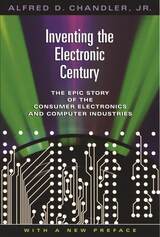
This account of efforts to build a domestic Japanese computer industry is enlivened with quotations from industrial leaders commenting on the stages through which Japan has emerged as a world-class competitor.
In the late 1950s, Japan was still relying on IBM and other foreign suppliers. After the decision to enter the computer field, the government used protectionism, financial aid, and cooperative R&D projects to assist firms in developing hardware and improving their technology. The establishment of a quasi-public computer rental company to carry the burden of financing rentals played a key role in helping fledgling firms compete with IBM.
Marie Anchordoguy shows how government intervention in the market avoided the risks of technological sluggishness by encouraging keen competition among domestic computer firms. She traces the growth of Japanese computer hardware to Japan’s position as an exporter of mainframes and describes some of the problems encountered in producing software. This study provides a clear example of the way in which government–industry cooperation has enhanced Japan’s position in the world market.

This compact history traces the computer industry from its origins in 1950s mainframes, through the establishment of standards beginning in 1965 and the introduction of personal computing in the 1980s. It concludes with the Internet’s explosive growth since 1995. Across these four periods, Martin Campbell-Kelly and Daniel Garcia-Swartz describe the steady trend toward miniaturization and explain its consequences for the bundles of interacting components that make up a computer system. With miniaturization, the price of computation fell and entry into the industry became less costly. Companies supplying different components learned to cooperate even as they competed with other businesses for market share. Simultaneously with miniaturization—and equally consequential—the core of the computer industry shifted from hardware to software and services. Companies that failed to adapt to this trend were left behind.
Governments did not turn a blind eye to the activities of entrepreneurs. The U.S. government was the major customer for computers in the early years. Several European governments subsidized private corporations, and Japan fostered R&D in private firms while protecting its domestic market from foreign competition. From Mainframes to Smartphones is international in scope and broad in its purview of this revolutionary industry.

Sara Schoonmaker uses the technology industry to delve into one of the key political conflicts of our time: the construction of a free trade regime determined to open markets around the world to global capital, and attempts by Latin American, African, and other governments to resist this process. The Brazilian computer case is a prime example of a nationalist effort to promote local growth of a key high-technology industry—an effort that was eventually dismantled under the pressures of what Schoonmaker views as part of a broader process of neoliberal globalization.
High-Tech Trade Wars presents a multidimensional view of the globalization process, where economic changes are shaped by political struggle and cultural discourse. It includes interviews with Brazilian industrialists and state officials involved with implementing and, eventually, dismantling Brazil’s informatics policy, and discussions of grassroots-level protests organized against neoliberal globalization during the recent WTO meetings in Seattle and Davos, Switzerland.


READERS
Browse our collection.
PUBLISHERS
See BiblioVault's publisher services.
STUDENT SERVICES
Files for college accessibility offices.
UChicago Accessibility Resources
home | accessibility | search | about | contact us
BiblioVault ® 2001 - 2024
The University of Chicago Press









